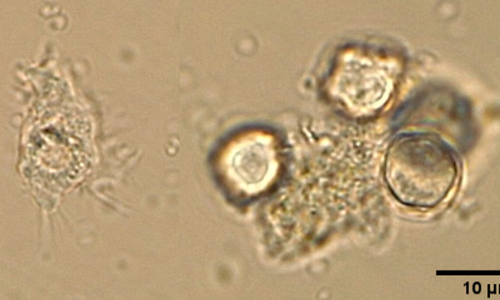Protist in sustainable agriculture
Hello, my name is Julia Sacharow, and I am a PhD student in Professor Schnell’s research group at the Institute of Applied Microbiology, Justus-Liebig-University, Giessen. The potential use of protists in sustainable agriculture has been widely discussed in the literature and explored in various contexts, but it has never been implemented on a large scale. My doctoral research focuses on laying the groundwork for utilising protists in sustainable agriculture. My work involves characterizing the natural diversity of cercozoans in winter wheat and spring barley across different growth stages, from pre-seeding soil to post-harvest soil. Additionally, I am investigating the use of fungivorous protists to mitigate the pathogenic pressure of powdery mildew on barley leaves, as well as the application of omnivorous protists for seed inoculation to promote plant growth.
When I began with my PhD, one of the first papers I encountered discussed the profound impact of protist inoculation on seedling root growth and nutrient uptake. It is well-established that protists are integral components of the plant root microbiome. They can consume surrounding microorganisms, thereby reducing pathogenic pressure on the roots and releasing nutrients from their prey that can be absorbed by the plant. I was puzzled as to why, given the significant environmental concerns associated with chemical fertilizers, this knowledge wasn’t more widely applied in large-scale agriculture. The need for sustainable organic farming is becoming increasingly urgent with the rising global population and the environmental damage caused by chemical fungicides and fertilizers. This motivated me to conduct my own research using the simplest inoculation process described in the literature applied to other key agricultural crops.
My recent publication explored the concept of leveraging the microbial loop to naturally promote plant growth in spring barley. The aim of my study was to assess whether inoculating spring barley seeds with the omnivorous protist Acanthamoeba castellanii – either alone or in combination with prey organisms consisting of soil bacteria, could enhance plant growth in a natural way. However, the experiment did not demonstrate any significant plant growth promotion following inoculation with A. castellanii. There were no noticeable differences in root length, root surface area, root volume, leaf length, or nutrient content in the plants or the experimental system despite repeating inoculations. This suggests that A. castellanii alone is insufficient as an inoculant to promote the growth of spring barley seeds. Future experiments might benefit from co-inoculation with plant-growth-promoting bacteria or the addition of supplementary nutrients. I was surprised to find that the inoculation had no effect on root growth or plant nutrient content, but I was determined to publish these findings to share them with the scientific community and encourage others to explore this area using different approaches. Because of that, I repeated the experiment multiple times to confirm the absence of any significant effects from the inoculation. With positive results, I likely would not have conducted such thorough repetition.

At present, there is a growing interest in this field, with more scientists being interested in protist and agriculture. This area of research offers a wealth of untapped possibilities with significant potential that will be crucial in the future. I hope that in the future, more researchers will recognize the tremendous potential of using protists in sustainable, environmentally-friendly agriculture for much more research in this area. I believe there is great promise in further by using protists in reducing pathogenic pressure and promoting plant growth, particularly through the combination with other microorganisms in consortia, which could yield multiple effects on plant health and productivity. I am particularly excited about the prospect of seeing protist inoculations—whether as single organisms or as part of whole consortia aimed at enhancing plant health—being introduced in large-scale field trials and ultimately integrated into the agricultural industry, much like the widespread adoption of plant-growth-promoting bacteria.

Thumbnail image: iStock/morrbyte
